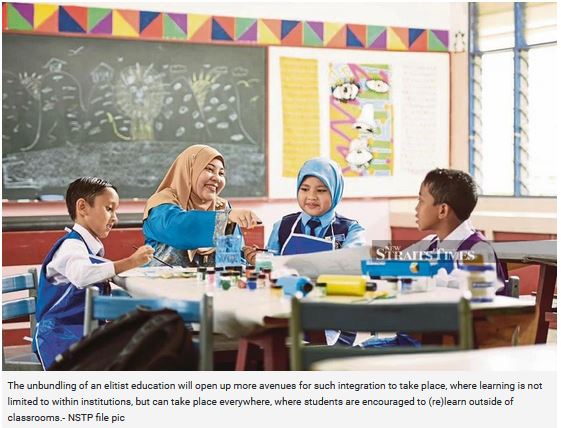To humanise leadership, love what you do and view failures positively
Emeritus Professor Tan Sri Dato' Dzulkifli Abdul Razak
Opinion - New Straits Times
December 1, 2021
TODAY is World Futures Day. An inspiring webinar on humanising leadership for a transformative future was held last week.
The Indonesian education, culture, research and technology minister focused on the importance of education and the role of leaders in making sure that education is well delivered to students, communities and industries
He said what Indonesia had done and planned to under his portfolio was to ensure the importance of education and the role of academic and institutional leaders in shaping the transformative way forward.
Prior to the keynote address, the International Islamic University Malaysia rector reiterated the need for education to focus on building and nurturing better human beings first so that the link to humanity and humanitarian values is not broken, but is instead reinforced.
Higher education institutions should take up the leadership role in humanising education and humanising leaders.
In the case of IIUM, the role of a viceregency of humankind must be well rooted to overcome challenges, not least the Covid-19 pandemic.
The culture of knowledge seeking and dissemination must be reflective and oriented to the wellbeing of the individual, community and world.
To do this, education systems need to move away from compartmentalisation to a more multi- and trans-disciplinary approach to seeking solutions.
This is reinforced by the fact that more jobs or professions are directed at complex problems (climate crisis, pandemic, systematic racism and sexism) that require more than one area of knowledge.
This means that the integration of various bodies of knowledge is imperative.
The unbundling of an elitist education will open up more avenues for such integration to take place, where learning is not limited to within institutions, but can take place everywhere, where students are encouraged to (re)learn outside of classrooms.
In other words, engaging with the community and exposing them to real societal demands and reality on the ground to allow for the implementation of real solutions.
This could come in the form of living labs supported by the community.
By so doing, the path of character development and developing a socially conscious human is by doing things, rather than learning through textbooks or online.
Empathy is the cornerstone of such education.
This also allows for social mobility, thus functioning as a leveller of society when issues — such as inequalities, inequities and injustices — are addressed.
It calls for collaboration between the parties involved, given that the pandemic has worsened inequalities.
Access to the Internet is crucial to ensure that no one is left behind.
Unless collaborations are undertaken, this goal is easier said than done.
The Indonesian minister highlighted that the biggest challenge in reforming education is resistance to change, which includes political resistance.
People are becoming complacent doing the same thing for years, thus making resistance to change bigger.
He said there were three elements needed to ensure change: political will, policy and people.
Of these, the people driving the changes are the most important element.
With a good team consisting of a balance between experts and executors, the job will be done. Malaysia has an inherent weakness in executing projects.
Despite the struggles faced in this pandemic, it is an opportunity for youth to excel.
To get through this difficult time, it is important to take as much risk as early as possible, as risk is necessary for any achievement.
Failures should be viewed positively, as we learn most during our failures rather than successes.
The only way to get better at something is to love what you do, and build enough self-awareness and to challenge one's opinion, because facts may change, especially when things are uncertain.
Be that as it may, humanising leadership needs to stay abreast of changes so that humanity can reap the benefits of a changing environment. Covid-19 is a case in point.
* The writer, an NST columnist for more than 20 years, is International Islamic University Malaysia rector

